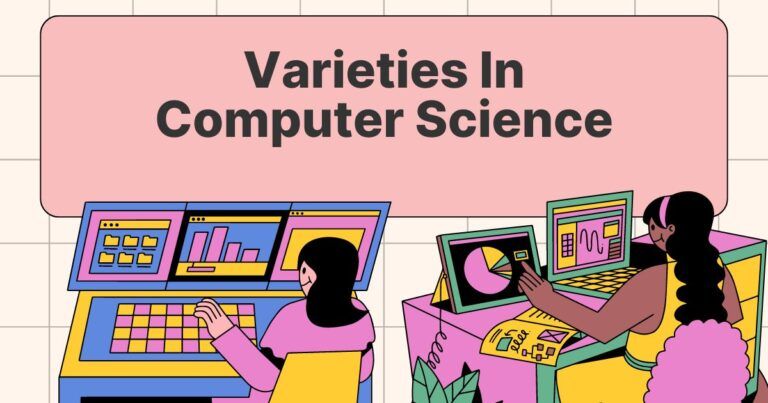Introduction
Computer science is a diverse and rapidly growing field. It mainly focuses on understanding how a computer works, designing algorithms to meet tasks, and developing software systems to solve complex problems. Computer science includes a wide range of topics such as programming languages, data structures, database management, algorithms, computer architecture, operating systems, artificial intelligence, and computer networks. As programming is highly in demand and has various opportunities, many parents want their kids to pursue a degree in computer science.
The computer courses after the 10th include many topics that can enhance your kid’s knowledge about computers and their applications. If your kid is interested in problem-solving and mathematics, a computer science degree is a great option!
Graduates in computer science are in high demand in various sectors. Students pursuing a computer science degree can get employed in the development of artificial intelligence, machine learning, data science, big data, and programming languages.
Varieties in Computer Science

Computer science is a huge world consisting of various fields in it. Every field in computer science focuses on different aspects in computing and technology. Here are some of the major fields in computer science:
Artificial Intelligence (AI):
AI involves creating systems that can perform tasks that normally require human intelligence. This includes machine learning, natural language processing, computer vision, and robotics.
Machine Learning:
Machine learning is a subset of AI that focuses on developing algorithms and statistical models that enable computers to learn from and make predictions or decisions based on data. Applications include recommendation systems, image recognition, and predictive analytics.
Data Science:
Data science involves extracting insights and knowledge from large volumes of structured and unstructured data. It combines elements of statistics, machine learning, and data visualization to analyze and interpret data for decision-making and strategy.
Software Engineering:
Software engineering focuses on the design, development, testing, and maintenance of software systems. It emphasizes principles like software architecture, coding standards, version control, and software project management.
Computer Networks:
This field deals with the study of communication networks that enable computers and devices to exchange data. Topics include network protocols, routing algorithms, network security, and wireless communication.
Cybersecurity:
Cybersecurity involves protecting computer systems, networks, and data from unauthorized access, attacks, and damage. It includes areas such as cryptography, network security, information security policies, and ethical hacking.
Database Systems:
Database systems focus on the design, implementation, and management of databases that store and manipulate structured data. This includes relational databases (SQL), NoSQL databases, data modeling, and database optimization.
Human-Computer Interaction (HCI):
HCI examines the design and usability of computer technology, emphasizing the interaction between users and computers. It includes user interface design, usability testing, accessibility, and interaction design principles.
Computer Graphics and Visualization:
This field involves creating and manipulating visual content using computers. It includes topics such as 3D modeling, animation, virtual reality (VR), augmented reality (AR), and data visualization techniques.
Bioinformatics:
Bioinformatics applies computational techniques to analyze and interpret biological data, such as DNA sequences and protein structures. It combines elements of biology, computer science, and statistics to advance research in genetics, medicine, and biotechnology.
Web Development and Mobile Computing:
These fields focus on designing and developing applications for the web and mobile platforms. It includes front-end development (HTML/CSS/JavaScript), back-end development (server-side programming), mobile app development (iOS/Android), and responsive web design.
Parallel and Distributed Computing:
This field deals with designing algorithms and systems that distribute computing tasks across multiple processors or computers. It includes topics like parallel algorithms, distributed systems, cloud computing, and grid computing.
Benefits Of A Computer Science Degree
As we all know, computer science plays a very important role in our lives. It has improved with generations and has had a good impact on the public. It has revolutionized communication, helped grow e-commerce and social media, enabled powered innovations, and much more. It focuses on the theory, design, development, and applications of computers and software.
There are many benefits of a computer science degree:
Strong Job Market and High Earning Potential:
- High Demand: The tech industry is booming, and there’s a constant need for qualified computer scientists. This translates to a strong job market with plenty of opportunities for graduates.
- Diverse Options: With a computer science degree, you’ll qualify for a wide range of tech jobs, from software engineer and web developer to cybersecurity specialist and data scientist. This flexibility allows you to find a role that aligns with your interests and skills.
- Competitive Salaries: Tech jobs typically offer competitive salaries. According to Payscale (May 2024 data), computer science graduates can expect to earn an average of $93,000 per year.
Valuable Skills and Problem-Solving:
- Technical Expertise: During your studies, you’ll gain strong programming skills in various languages, understand computer architecture, and learn algorithms and data structures. These technical skills are highly sought after by employers.
- Problem-Solving Prowess: At its core, computer science is about solving problems through logical thinking and creative solutions. This valuable skill translates well to many fields and can be a lifelong asset.
- Adaptability and Continuous Learning: The tech industry is constantly evolving. A computer science degree equips you with the ability to learn new technologies and adapt to changing demands, making you a valuable asset in the long run.
Beyond the Technical:
-
- Innovation and Creativity: Computer science isn’t just about coding; it’s about using technology to solve problems and create innovative solutions. This field allows you to be part of shaping the future.
- Global Relevance: Technology is a universal language. A computer science degree opens doors to opportunities worldwide.
- Entrepreneurial Potential: The skills you learn in computer science can also be used to develop your own software products or launch your own tech startup.
What Is A Diploma In Computer Science?

Course Structure:
- Focus: The curriculum emphasizes hands-on learning and practical applications.
- Core Subjects:
- Programming Languages (e.g., Python, Java, C++)
- Software Development Fundamentals (SDLC)
- Database Management Systems (DBMS)
- Computer Hardware and Networking
- Operating Systems
- Web Development (optional)
- Mathematics (Discrete Mathematics, Calculus)
- Practical Learning: You’ll have ample opportunities to apply your theoretical knowledge through labs, projects, and assignments. This could involve:
- Creating simple software applications
- Working with databases
- Troubleshooting computer systems
- Building websites (depending on the program)
- Project Work: Many programs culminate in a capstone project where you independently apply your learned skills to solve a real-world problem.
Assessment:
- Exams: Written exams to test your understanding of theoretical concepts.
- Practical Assessments: Projects, labs, and assignments to evaluate your coding skills and ability to apply knowledge in practical scenarios.
Variations:
- Specializations: Some institutions may offer specialized diplomas in areas like web development, networking, or cybersecurity. These programs tailor core coursework to specific industry needs.
- Semester System: The course might be divided into semesters with specific learning objectives for each.
What Happens If You Pursue A Diploma In Computer Science After 10th
If you are wondering about pursuing a diploma in computer science after the 10th, you can gain practical knowledge and skills which can benefit your career. This can also provide you with technical skills that are relevant to the industry. With the help of this focused training, you can be proficient in programming languages and other computer science-related areas.
Completing a diploma in computer science after the 10th can get you an earlier experience in the workforce. Diploma programs are more cost-effective as they’re typically shorter compared to an undergraduate degree.
Benefits Of Diploma In CS After 10th
Early Entry into the Workforce:
- Faster Completion: Compared to a bachelor’s degree (3-4 years), a diploma program takes 1-3 years, allowing you to enter the workforce sooner and start earning a living.
Practical Skills and Job Opportunities:
- Hands-on Learning: The curriculum focuses on practical skills like programming, software development, networking, and system administration. You’ll build a strong foundation for entry-level IT and software development jobs.
- Wide Industry Applicability: The knowledge gained is relevant across various sectors like IT, web development, mobile app development, and more.
Flexibility and Further Education:
- Stepping Stone to a Degree: Your diploma can be a stepping stone towards a bachelor’s degree in computer science. Many institutions offer credit transfer programs, allowing you to leverage your diploma coursework.
- Learn While You Earn: With a diploma, you can start working while pursuing a bachelor’s degree part-time. This gives you practical work experience alongside theoretical knowledge.
Additional Benefits:
- Competitive Starting Salary: While the salary might be lower than a bachelor’s degree holder initially, you can still earn a decent starting salary.
- Develop Valuable Skills: The program hones your problem-solving, analytical thinking, and communication skills, which are valuable assets in any career path.
- Increased Employability: In today’s technology-driven world, computer skills are highly sought-after. A diploma gives you an edge in the job market.
Things to Consider:
-
- Job Advancement: While a diploma opens doors, some employers may prefer a bachelor’s degree for more advanced positions.
- Research Programs: Further education might be necessary for research-oriented computer science careers.
Challenges You May Face During Your Journey

-
Academic Rigor: Diploma programs in computer science can be intensive, covering a wide range of topics from programming languages to database management and networking. Keeping up with the pace of coursework and assignments can be demanding.
-
Technical Complexity: Understanding and applying concepts in computer science, such as algorithms, data structures, and software development methodologies, can be challenging, especially if you are new to programming and computer systems.
-
Practical Skills Development: While theoretical knowledge is essential, applying that knowledge practically can pose challenges. Hands-on labs, projects, and assignments may require problem-solving skills and the ability to debug code effectively.
-
Time Management: Balancing coursework, assignments, and possibly part-time work or internships can be challenging. Effective time management skills are crucial to meeting deadlines and maintaining academic performance.
-
Mathematical Foundations: Computer science often involves mathematical concepts such as discrete mathematics, calculus, and statistics. Understanding and applying these concepts to solve problems in programming and algorithms can be daunting for some students.
-
Technology and Tools: Keeping pace with rapidly evolving technologies, programming languages, and development tools can be overwhelming. Continuous learning and staying updated with industry trends are essential but can add to the workload.
-
Team Projects and Collaboration: Many diploma programs include group projects that require collaboration with peers. Managing team dynamics, coordinating tasks, and ensuring project success can present challenges.
-
Career Planning and Pathways: Understanding career opportunities, choosing the right specialization, and planning for further education or certifications can be daunting. Guidance from mentors, career counselors, or industry professionals may be beneficial.
-
Financial Considerations: Tuition fees, cost of textbooks and materials, and other expenses associated with education can be significant. Financial planning and possibly seeking scholarships or financial aid may be necessary.
-
Work-Life Balance: Balancing academic commitments with personal life, hobbies, and social activities can be challenging. It’s important to prioritize self-care and manage stress effectively during your educational journey.
Conclusion
Computer Science is a versatile and dynamic field that offers numerous benefits and opportunities. These skills can be applied in various industries. Studying cs after completing 10th through a diploma can be an excellent choice. it provides knowledge to students with practical skills before pursuing higher education.
By choosing a diploma in cs, candidates can get an early entry to the workforce and begin working at an entry-level position in various other fields like software development, IT support, data analysis, and much more. A diploma in cs is after the 10th can be a big stepping stone for students moving forward to a more advanced level of study. It offers more practical knowledge than theoretical knowledge.
Graduates with a diploma in cs can find opportunities in diverse industries, including technology, healthcare, entertainment, and more. Individuals can gain skills like programming, problem-solving, and logical thinking which are essential for their professional growth. They keep learning and updating themselves with the ongoing changes in the technological industries.
We hope that you gained your understanding about a diploma in computer science.
